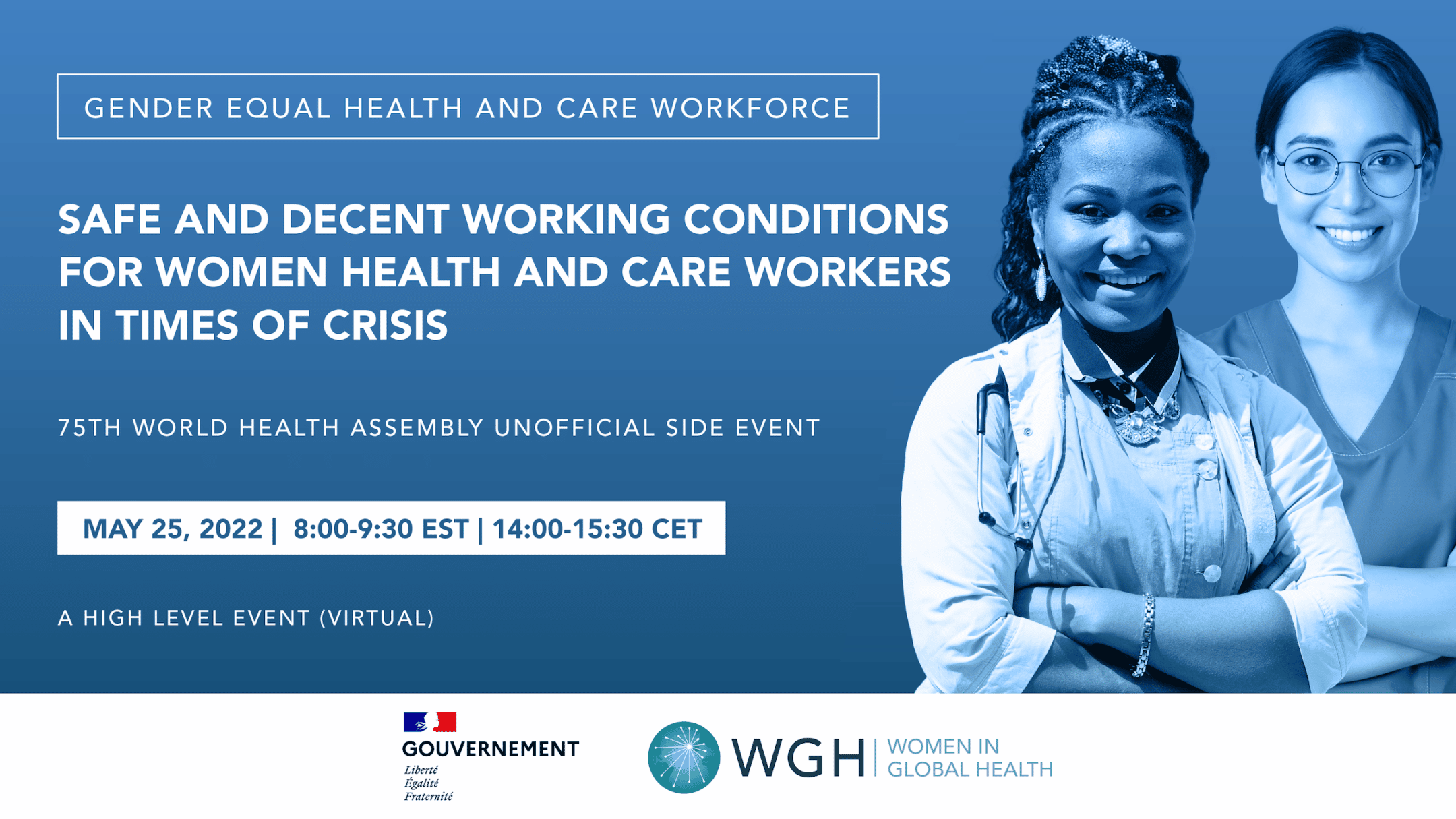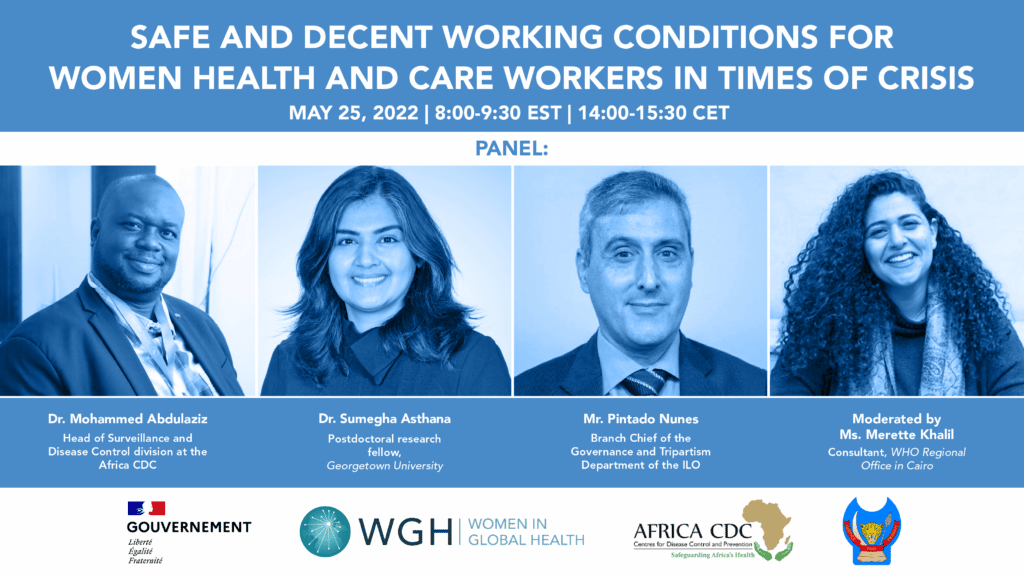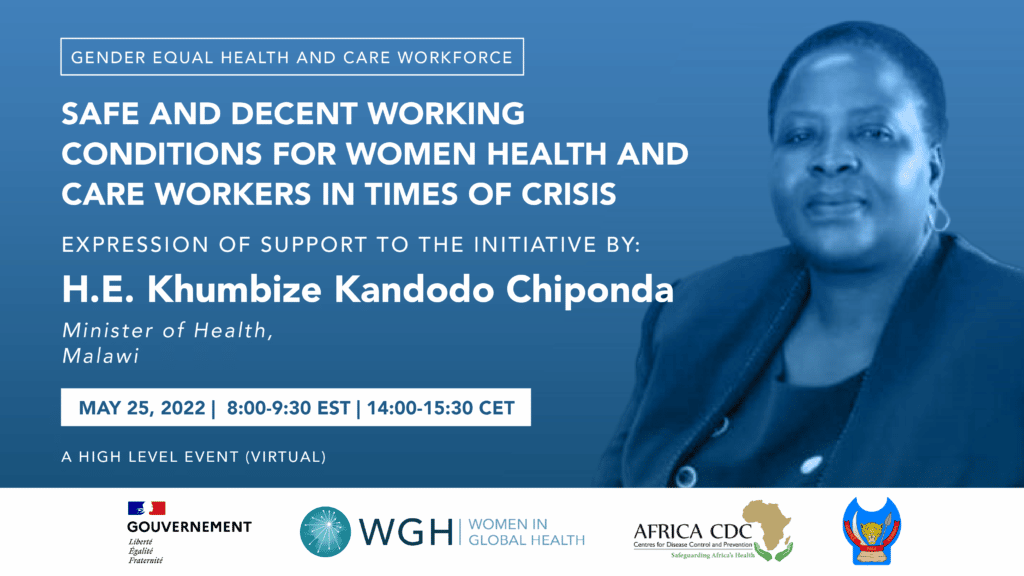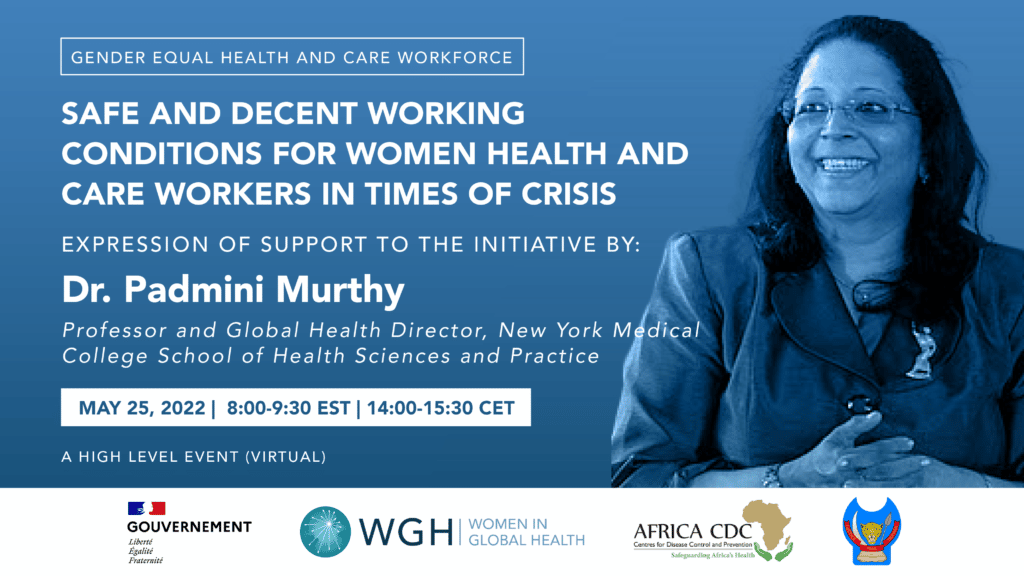
- This event has passed.
Safe and decent working conditions for women health and care workers in times of crisis
May 25, 2022 @ 2:00 pm - 3:30 pm

WATCH THE EVENT
About the event
Three years into a pandemic, health systems are severely strained, especially since health workers have been lost to infection, ‘long Covid’, burnout and migration. The world is facing a projected 40 million health worker shortage, which will be worsened by the ‘great resignation’ of health workers, especially women, currently underway. Significant numbers are planning to leave the health workforce due to lack of support, low pay, unsafe conditions, feeling marginalized in decision making with little acknowledgement of their expertise.
A regional survey in sub-Saharan Africa found only 1 in 8 health workers were fully vaccinated. Women in Global Health’s own global survey found that only 14% of women health workers had adequately fitted Personal Protective Equipment (PPE) since PPE is designed for the male body. Simultaneously, women health workers in low and middle income countries are carrying the burden of underpaid or unpaid work within the health sectors as well as facing significant challenges, such as lack of access to COVID-19 vaccinations, Personal Protective Equipment and risk of violence and harassment from colleagues and patients. Women health workers have been told they are essential but they feel expendable.
This crisis creates conditions that are exacerbated when additional crises intersect, as it has occured with the onset of the COVID-19 pandemic, as well as an increased number of humanitarian settings across the world. From Afghanistan to Ukraine and Ethiopia, the impact of this double crisis is notable in health systems, particularly on the health workers on the frontlines.
Against this backdrop, Women in Global Health, in collaboration with the Government of France, propose a high-level 90-minute panel event on the sidelines of the 75th World Health Assembly, on 25th May at 8:00-9:30 am EST.
Key messages
-Women have made an extraordinary contribution to health and economies as 70% of the health and care workforce, and 90% of patient-facing roles during the Covid-19 pandemic
-Women health and care workers have historically been subjected to unsafe working conditions, prone to being victims of violence and harassment from patients and colleagues
-Working conditions of health and care workers have become worse since the start of the COVID-19 pandemic, as health systems are strained by patient numbers.
-Intersecting crises, both pandemic and humanitarian, create dire and unsustainable situations for health and care workers that put at risk their lives and the lives of the patients they serve.
A fair social contract for women in health based on equal pay, decent work and equality in decision making will have wider benefits enabling the expansion of the global health and care workforce needed to achieve global health goals, including UHC and achieving a gender triple dividend:
1) Better health: fair pay and decent work will attract and retain female health workers, helping to fill the 10 million global health worker gap.
2) Gender equality: investing in fairly paid, formal sector jobs for women in health will increase gender equality as women gain economic and decision making power.
3) Economic growth: new jobs created in the health and care sector will fuel economic growth.
—————————————————————————————————-
Join us for a discussion featuring Ms. Merette Khalil, consultant on COVID-19 response, gender equity, and health systems strengthening WHO Regional Office in Cairo as a moderator.
SPEAKER LIST
-Dr. Magda Robalo, Managing Director, Women in Global Health
-Dr. Lia Tadesse, Minister of Health, Ethiopia
-Ms. Loyce Pace, Assistant Secretary, USG
-Dr. Jean-Jacques Mbungani Mbanda, Minister of Health, Democratic Republic of Congo
-Dr. Saleema Rehman, UNHCR Health worker

PANELISTS
-Dr. Sumegha Ashtana, WGH India and Postdoctoral research fellow, Georgetown University
-Mr. Pintado Nunes, Branch Chief of the Govenance and Tripartisan Department of the ILO
-Dr. Mohammed Abdulaziz, Head of Surveillance and Disease Control division at the Africa CDC

Expressions of support to the initiative will be provided by:
-H.E. Khumbize Kandodo Chiponda, Minister of Health, Malawi
-Dr. Padmini Murthy, Global Health Lead, American Medical Women’s Association

